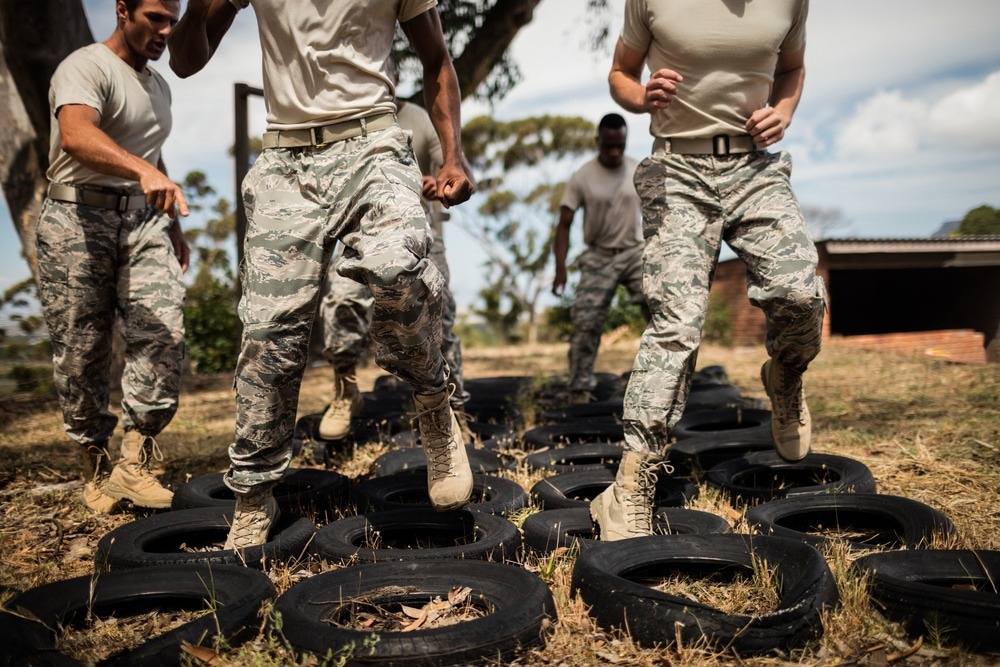WHOM do we contact to get this tested in stroke survivors? With NO leadership and NO strategy in stroke nothing ever gets done.
A study of the effects of beta-alanine supplements on soldiers' performance
In a recent study published in the journal Nutrients, researchers review the effects of β-alanine supplementation on soldiers’ performance, cognition, and resilience.
Study: The Effect of β-Alanine Supplementation on Performance, Cognitive Function and Resiliency in Soldiers. Image Credit: wavebreakmedia / Shutterstock.com
Ensuring the health of soldiers
Soldiers have physical capabilities resembling those of competitive athletes and must be fit to run and react quickly, as well as travel for long distances carrying heavy loads. Additionally, soldiers require high cognitive abilities for making decisions, often under fatigue and stress.
The effects of nutrition and dietary supplementation on the performance of soldiers and athletes have been extensively studied; however, less is known about their cognitive performance improvements. In the present study, researchers review the potential role of β-alanine supplementation on soldiers’ performance.
The physiological contribution of β-alanine
β-alanine is a non-essential amino acid produced in the liver. Carnosine, a dipeptide molecule, is made from β-alanine and histidine, particularly in type II skeletal muscle fibers.
β-alanine has limited ergogenic effects; however, its effects may be due to increased carnosine content. Carnosine plays a vital role in maintaining intracellular acid-base homeostasis.
Thus, β-alanine supplementation augments this buffering capacity by increasing carnosine levels in the skeletal muscle. Several reports suggest that carnosine exhibits antioxidant, anti-glycating, and ion-chelating properties.
Animal studies have also demonstrated that β-alanine elevates carnosine levels in various brain compartments. More specifically, β-alanine supplementation before exposure to stress was found to increase the animal’s resilience and attenuate inflammatory responses to the stressor.
Additionally, β-alanine supplementation significantly enhances athletic performance during prolonged high-intensity activity, with the greatest ergogenic effect observed during activities lasting 60-240 seconds.
Effects on military training
Two studies investigating the benefits of β-alanine supplementation on the tactical performance of soldiers found it to be effective in maintaining lower body power and psychomotor performance, with cognitive function improvements also observed.
To date, only one study has examined the impact of β-alanine supplementation on inflammatory responses to intense military training. This study identified high levels of interleukin 10 (IL-10), an anti-inflammatory cytokine, thus suggesting a therapeutic response to intense training.
Two studies have examined the role of β-alanine supplementation on the cognitive function of active military personnel, which revealed improvements in engagement speed and accuracy among soldiers supplemented with the amino acid.
The serial subtraction test was performed in a quiet environment in one of these studies and under stress in the other. While there were no differences in performance between β-alanine- and placebo-administered groups in the quiet environment, β-alanine-supplemented soldiers provided significantly more correct responses under stress than placebo-administered soldiers.
Effects on post-traumatic stress disorder, heat stress exposure, and mild traumatic brain injury
While no study has been performed in humans to examine the effect of
β-alanine on post-traumatic stress disorder (PTSD), one study
investigated the impact of β-alanine supplementation on PTSD in rats.
This study demonstrated that β-alanine supplementation effectively
increased resilience, with reduced anxiety measures in animals subjected
to a predator scent stress (PSS) stimulus.(This sounds promising for the
23% chance of stroke survivors getting PTSD but needs human testing which won't occur.)
Likewise, another animal study examined the effect of β-alanine supplementation on non-penetrating mild traumatic brain injury (mTBI). To this end, amino acid supplementation reduced the incidence of mTBI-like phenotype in animals subjected to a blast wave without head shielding.
Furthermore, β-alanine-supplemented animals exposed to heat stress had an attenuated thermoregulatory response and lower inflammatory response than those fed a normal diet.
Safety
Paresthesia, the sensation of tingling/numbing in the skin, is the only complication linked to β-alanine supplementation. However, this side effect generally occurs in individuals taking more than 800 mg/kg β-alanine in non-sustained release formulations.
In one study, investigators found no differences in paresthesia symptoms between β-alanine- and placebo-administered participants. The highest dose of 12 g/day administered for two weeks caused no changes in hematological variables.
No changes in hematological markers or on an electrocardiogram were observed after four weeks of β-alanine supplementation. Another study reported no differences in renal, muscle, and hepatic function markers upon 24 weeks of β-alanine supplementation. Moreover, a meta-analysis identified no adverse effects among individuals supplemented with β-alanine.
Concluding remarks
Taken together, the authors summarized the available evidence on β-alanine supplementation on soldiers’ performance. To this end, the effect of β-alanine supplementation on physical performance was similar to that in competitive athletes.
Importantly, available information on the impact of β-alanine on cognitive function was inconclusive, thus warranting more research in this area.
Nevertheless, resilience to common stressors was elevated upon β-alanine supplementation; however, this effect was only observed in animals. Therefore, more research is required in humans to provide further support.
- Ostfeld, I., & Hoffman, J. R. (2023). The Effect of β-Alanine Supplementation on Performance, Cognitive Function and Resiliency in Soldiers. Nutrients, 2023. doi:10.3390/nu15041039

No comments:
Post a Comment